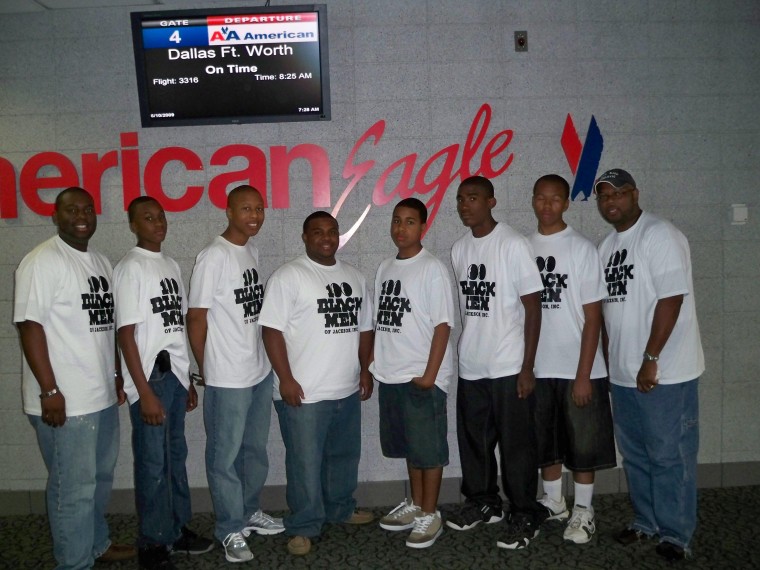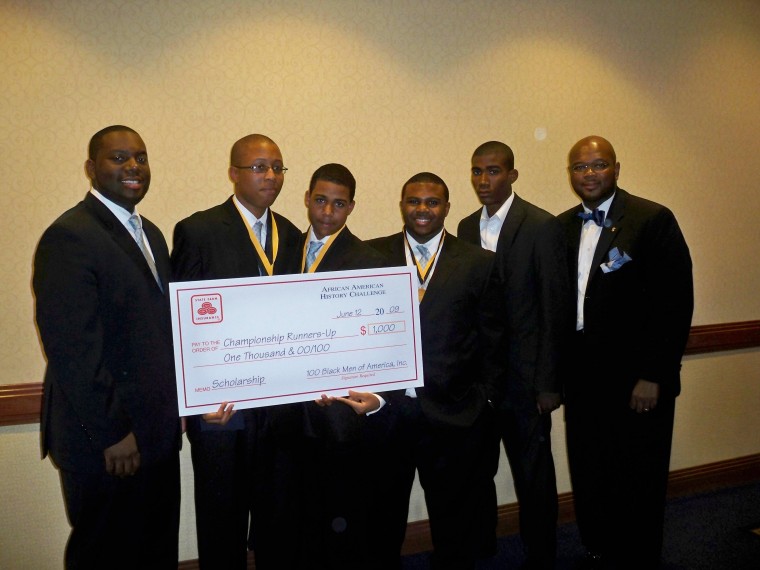It appears that Black communities are in crisis—from failing educational systems to escalating violence to high unemployment. Too often, youth suffer from a lack of leadership. As we have taken advantage of the gains won during the civil rights movement and have moved up the economic ladder, too many have forgotten to reach a hand back to help others uplift themselves.
The 100 Black Men of America [affectionately known as the “100”] and its chapters across the United States are reaching back and are educating and empowering youth and their families while positively impacting these communities.
During the 23rd Annual Conference that convened June 10-14, 2009, in Manhattan, New York, the men of the “100” turned their attention to the matter of education. This year’s conference theme was “Education on the frontline: Returning to the foundation of our past”. The “education on the frontline” theme resounded as teams from across the United States, Virgin Islands, Bahamas and England vied for the coveted “100” title via the African American History competition. This competition is an integral part of the annual conference, and a nationally venerated event. Each chapter of the “100” is allowed to have one junior team (grades 6-8) and one senior team (grades 9-12) participate in their respective divisions.
The Jackson, Mississippi chapter of the “100” showed up and showed out as the senior team [Joshua Hairston, a sophomore at Murray High school; Michael Williams, a graduating senior from Murray High school; Phillip LeDuff, first alternate and a graduating senior from Murray High School and Zachary Jackson, second alternate and sophomore at Murray High School] secured the 2nd place, $1,000 title; and, the junior team [Austin Fenney, entering freshman at Murray High School and O J Oluade, entering freshman at Murray High School] secured the 3rd place title in the African American History Challenge. The coaches for both teams are Julius Fleming, Jr. and Dr. Audwin Fletcher.
Since its inception in 1990 with Leroy Walker as the first president, the Jackson chapter of the “100” has made and continues to make a substantial impact in the lives of the youth in the Metro-Jackson community and the state of Mississippi. Jackson members that attended the conference were: President, Shelton Swanier; Vice- President, Don Lewis; Immediate past “Mentor of the Year”, Johnny Terry; Zach Williams; Terry Wray; and Mentoring Chairperson, Steve Denham. The education chairperson, Dr. Dion Porter was not able to attend the conference but stated, “As an educator for the last 10 years, I am very excited about the outcome of this year’s challenge bowl. I am very proud of both the junior and senior teams and believe that successful achievements as these make such a positive and dramatic impact, not only on the students who participated, but the mentees of the Men of the “100” of Jackson as well.”
The overall concept of “100” began in New York in 1963 [this year’s national conference that convened in New York marks the 46th anniversary] when a group of concerned African American men began to meet to explore ways of improving conditions in their community. The group eventually adopted the name “100 Black Men, Inc.” as a sign of solidarity. A movement was born when in 1976, Dr. William Hayling formed the 100 Black Men of New Jersey. Men from across the country began to form 100 Black Men organizations to leverage their collective talents and resources.
On September 21, 1983, a three hour meeting was held at the Washington Hilton Hotel in Washington, DC, with representatives from Los Angeles, New York, New Jersey, and St. Louis chapters. This meeting was to evaluate the feasibility of establishing a National Organization for the 100 Black Men. Incidentally this meeting was held during the annual weekend meeting of the Congressional Black Caucus. A final meeting was held on October, 2, 1986 at L’Enfant Plaza Hotel in Washington. Chapters represented were: Los Angeles, St. Louis, Indianapolis, Atlanta, and New Jersey. It was during this meeting by the chapters represented that the organization would become “100 Black Men of America, Inc.”
On May 27, 1987, in Atlanta, Georgia, this newly formed organization introduced itself to the nation during its first Annual Conference. In 1989, Nathaniel Goldston became the organization’s 2nd National President and expanded the organization into 43 chapters. Thomas W. Dortch, Jr. was elected the 3rd National President in 1994. That year he introduced an aggressive plan entitled “Four for the Future”. Since that time the organization has strategically channeled its resources towards programs that support these important areas: mentoring, education, health/wellness and economic development. The mission, vision and value statements are listed below:
• Mission is to improve the quality of life within our communities and enhance educational and economic opportunities for all African Americans.
• Vision of the 100 Black Men of America seeks to serve as a beacon of leadership utilizing our diverse talents to create environments where our children are motivated to achieve, and to empower our people to become self-sufficient shareholders in the economic and social fabric of the communities we serve.
• The 100 Black Men America value and are committed to the intellectual development of youth and the economic empowerment of the African American community based on the following precepts: respect for family, spirituality, justice, and integrity.
The chairman for the “100”, Albert E. Dotson is quoted, “The needs in our community continue to grow, both in size and complexity, this is perhaps even truer because of the worsening economy. New and creative ways to address issues in our community must be developed, shared and refined; organizations that serve our community must engage in collaborative work models that optimize our resources and leverage our strengths.”
With a mission to improve the quality of life and to enhance educational opportunities for African Americans, members of the “100” continue to serve as a strong force in the world by overcoming the cultural and financial obstacles that have limited the achievements of some African Americans, particularly, young African American males. Members of the “100” have made outstanding progress, proving that African Americans can, and do, excel. This is evident as the organization has grown to over 114 chapters worldwide with more than 10,000 members and more than 100,000 youth participants in its mentoring and youth development programs, annually.




Be the first to comment